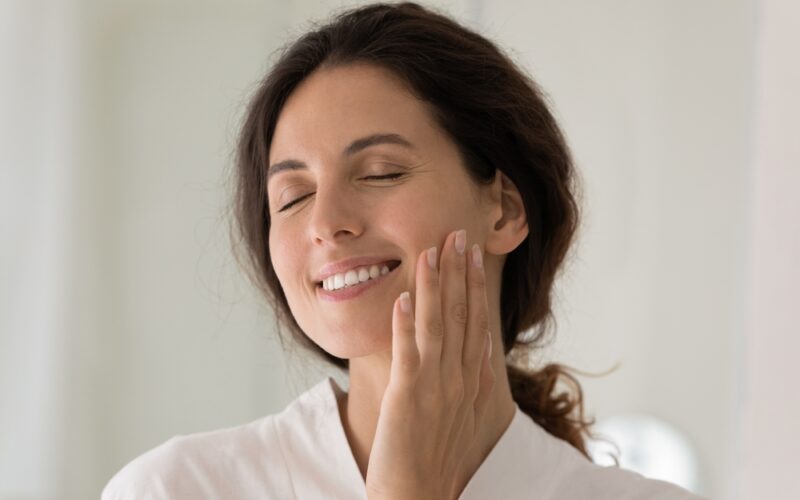Skin treatments for acne, rosacea, and other conditions can sometimes be tough on your skin. While these treatments work to clear your condition, they may temporarily stress your skin’s natural healing abilities. Glutathione, known as the body’s master antioxidant, may help support skin recovery during these challenging treatment periods.
What is Glutathione and How Does it Work for Skin?
Glutathione is a powerful antioxidant your body produces naturally from three amino acids: glutamine, glycine, and cysteine. This compound plays a key role in detoxification and cellular repair that directly benefits your skin.
Your skin constantly battles oxidative stress from UV radiation, pollution, and toxins. Glutathione neutralizes harmful free radicals that can damage skin cells and slow healing. By protecting cellular health, it helps maintain your skin’s structure and supports natural repair processes.
Glutathione excels at detoxification by binding to toxins and heavy metals, making them easier to remove from your body. This cleansing action reduces the burden on skin cells, allowing them to function better during healing.
It also helps recycle other antioxidants like vitamins C and E, extending their protective benefits and creating stronger defense for skin cells during recovery.
How Glutathione Promotes Skin Healing During Acne Treatment
Strong acne treatments, especially medications like isotretinoin (Accutane), often cause dryness, sensitivity, and temporary inflammation while clearing breakouts. Glutathione can help reduce these side effects and support healing in several ways.
Glutathione controls inflammation by neutralizing free radicals and regulating inflammatory responses. This anti-inflammatory action helps reduce excessive redness and irritation that can delay healing and contribute to scarring.
It also supports collagen production, which is essential for skin repair and scar prevention. By promoting healthy collagen synthesis and protecting existing collagen from damage, glutathione helps maintain skin elasticity during treatment periods when your skin might otherwise become more vulnerable.
The antioxidant also aids in cell renewal, helping your skin shed damaged cells and replace them with healthy new ones. This renewal process is especially important during treatments that speed up skin cell turnover.
The Synergy Between Glutathione and Acne Medications
Glutathione complements many skin treatments by addressing different aspects of skin health than your primary medications target. While treatments like retinoids normalize cell turnover and reduce oil production, glutathione works at the cellular level to support overall skin resilience.
For patients using isotretinoin, which can deplete skin antioxidants and increase sensitivity, glutathione supplementation may help restore balance. This support could potentially reduce some side effects while allowing the medication’s benefits to continue.
Glutathione’s detoxifying properties may also enhance medication effectiveness by helping clear cellular waste that could interfere with healing. By optimizing cell function, it creates an environment where medications can work more efficiently.
Additionally, it may help protect your skin’s moisture barrier, which often becomes compromised during aggressive treatments. A healthier barrier means better hydration and less water loss, potentially reducing treatment-related dryness.
How to Use Glutathione for Optimal Skin Healing
You can incorporate glutathione into your skin healing regimen in several ways:
Oral supplements aim to increase glutathione levels throughout your body, benefiting your skin from within. Look for supplements containing all three precursor amino acids or acetylated forms for better absorption. Typical doses range from 250-1000mg daily, but always consult your healthcare provider first.
Topical glutathione products deliver the antioxidant directly to your skin. These include serums, creams, or masks containing glutathione along with supportive ingredients like vitamin C. Topical applications work well for targeted healing support in specific problem areas.
Supporting your body’s natural glutathione production is equally important. Eat sulfur-rich foods like garlic, onions, and cruciferous vegetables to provide the building blocks your body needs. Adequate protein intake, especially whey protein, can also boost production.
Potential Side Effects of Glutathione for Skin Healing
While glutathione offers many benefits for skin healing, be aware of potential side effects when using it alongside other treatments.
Some people experience digestive discomfort with oral supplements, including bloating or loose stools. Starting with lower doses and gradually increasing can help minimize these effects.
Those using topical glutathione should perform patch tests before full application, as skin irritation is possible, especially on treatment-sensitized skin. Stop using if persistent redness or discomfort occurs.
Always consult with healthcare providers before combining glutathione with prescription skin treatments. While generally complementary, interactions could potentially occur with medications that affect liver function.
Through Heally’s network of healthcare providers, you can receive personalized guidance on safely incorporating glutathione into your skin treatment regimen. Our professionals can help determine the right form and dosage based on your specific condition and treatment plan.
Schedule a consultation with Heally today to discuss how glutathione might support your skin healing journey.
Sources
NIH: The Role of Antioxidants on Wound Healing: A Review of the Current Evidence
Healthline: Glutathione Benefits
JAAD: Effects of oral glutathione on skin appearances: A randomized placebo-controlled study

